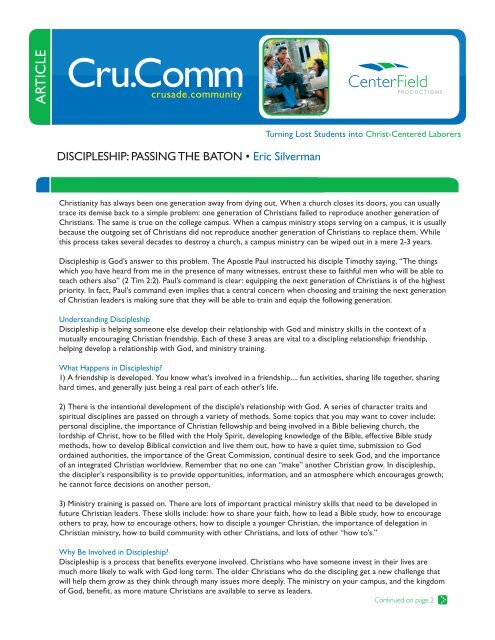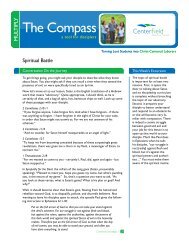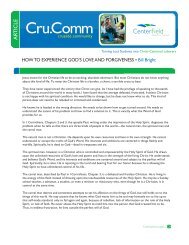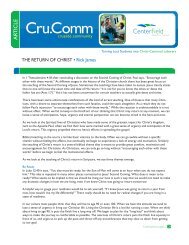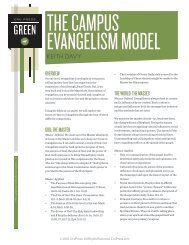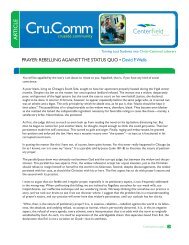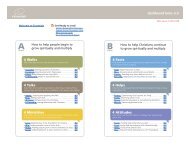Discipleship: Passing the Baton, by Eric Silverman - Cru Press Green
Discipleship: Passing the Baton, by Eric Silverman - Cru Press Green
Discipleship: Passing the Baton, by Eric Silverman - Cru Press Green
You also want an ePaper? Increase the reach of your titles
YUMPU automatically turns print PDFs into web optimized ePapers that Google loves.
ARTICLE<br />
DiSCipleSHip: paSSinG tHe <strong>Baton</strong> • <strong>Eric</strong> <strong>Silverman</strong><br />
Christianity has always been one generation away from dying out. When a church closes its doors, you can usually<br />
trace its demise back to a simple problem: one generation of Christians failed to reproduce ano<strong>the</strong>r generation of<br />
Christians. The same is true on <strong>the</strong> college campus. When a campus ministry stops serving on a campus, it is usually<br />
because <strong>the</strong> outgoing set of Christians did not reproduce ano<strong>the</strong>r generation of Christians to replace <strong>the</strong>m. While<br />
this process takes several decades to destroy a church, a campus ministry can be wiped out in a mere 2-3 years.<br />
<strong>Discipleship</strong> is God’s answer to this problem. The Apostle Paul instructed his disciple Timothy saying, “The things<br />
which you have heard from me in <strong>the</strong> presence of many witnesses, entrust <strong>the</strong>se to faithful men who will be able to<br />
teach o<strong>the</strong>rs also” (2 Tim 2:2). Paul’s command is clear: equipping <strong>the</strong> next generation of Christians is of <strong>the</strong> highest<br />
priority. In fact, Paul’s command even implies that a central concern when choosing and training <strong>the</strong> next generation<br />
of Christian leaders is making sure that <strong>the</strong>y will be able to train and equip <strong>the</strong> following generation.<br />
Understanding <strong>Discipleship</strong><br />
<strong>Discipleship</strong> is helping someone else develop <strong>the</strong>ir relationship with God and ministry skills in <strong>the</strong> context of a<br />
mutually encouraging Christian friendship. Each of <strong>the</strong>se 3 areas are vital to a discipling relationship: friendship,<br />
helping develop a relationship with God, and ministry training.<br />
What Happens in <strong>Discipleship</strong>?<br />
1) A friendship is developed. You know what’s involved in a friendship.... fun activities, sharing life toge<strong>the</strong>r, sharing<br />
hard times, and generally just being a real part of each o<strong>the</strong>r’s life.<br />
2) There is <strong>the</strong> intentional development of <strong>the</strong> disciple’s relationship with God. A series of character traits and<br />
spiritual disciplines are passed on through a variety of methods. Some topics that you may want to cover include:<br />
personal discipline, <strong>the</strong> importance of Christian fellowship and being involved in a Bible believing church, <strong>the</strong><br />
lordship of Christ, how to be filled with <strong>the</strong> Holy Spirit, developing knowledge of <strong>the</strong> Bible, effective Bible study<br />
methods, how to develop Biblical conviction and live <strong>the</strong>m out, how to have a quiet time, submission to God<br />
ordained authorities, <strong>the</strong> importance of <strong>the</strong> Great Commission, continual desire to seek God, and <strong>the</strong> importance<br />
of an integrated Christian worldview. Remember that no one can “make” ano<strong>the</strong>r Christian grow. In discipleship,<br />
<strong>the</strong> discipler’s responsibility is to provide opportunities, information, and an atmosphere which encourages growth;<br />
he cannot force decisions on ano<strong>the</strong>r person.<br />
3) Ministry training is passed on. There are lots of important practical ministry skills that need to be developed in<br />
future Christian leaders. These skills include: how to share your faith, how to lead a Bible study, how to encourage<br />
o<strong>the</strong>rs to pray, how to encourage o<strong>the</strong>rs, how to disciple a younger Christian, <strong>the</strong> importance of delegation in<br />
Christian ministry, how to build community with o<strong>the</strong>r Christians, and lots of o<strong>the</strong>r “how to’s.”<br />
Why Be Involved in <strong>Discipleship</strong>?<br />
<strong>Discipleship</strong> is a process that benefits everyone involved. Christians who have someone invest in <strong>the</strong>ir lives are<br />
much more likely to walk with God long term. The older Christians who do <strong>the</strong> discipling get a new challenge that<br />
will help <strong>the</strong>m grow as <strong>the</strong>y think through many issues more deeply. The ministry on your campus, and <strong>the</strong> kingdom<br />
of God, benefit, as more mature Christians are available to serve as leaders.<br />
Continued on page 2
ARTICLE ARTICLE TOPIC DISCIPLESHIP: TITLE PASSING THE BATON<br />
2<br />
Where and When Does <strong>Discipleship</strong> Take Place?<br />
<strong>Discipleship</strong> should take place in everyday life. Just as Jesus trained His disciples <strong>by</strong> involving <strong>the</strong>m in His everyday<br />
life and ministry, we should seek to involve those we disciple in our daily lives. The more life you share toge<strong>the</strong>r,<br />
<strong>the</strong> more opportunities <strong>the</strong>re are to teach <strong>by</strong> example. Sharing meals, exercising toge<strong>the</strong>r, even something as<br />
mundane as running errands toge<strong>the</strong>r, can provide venues for discipleship SO LONG AS you are committed to<br />
INTENTIONALLY building your life into his through <strong>the</strong>se venues. Of course, <strong>the</strong>re should be times where you<br />
plan to share ministry activities toge<strong>the</strong>r too.<br />
Who Should Be Discipled?<br />
everyone can benefit greatly from discipleship, but two groups of people that are especially important to disciple<br />
are potential future leaders and new Christians. Potential future leaders need discipleship to prepare <strong>the</strong>m for <strong>the</strong><br />
important responsibilities that lie ahead for <strong>the</strong>m. New Christians need discipleship to make sure <strong>the</strong>y get <strong>the</strong> solid<br />
grounding in Christianity that will prepare <strong>the</strong>m for a life long walk with God.<br />
Three Important Relationships:<br />
It has been said that every Christian needs 3 kinds of spiritual relationships in <strong>the</strong>ir lives. A Paul, a Barnabas, and a<br />
Timothy.<br />
Paul – The apostle Paul founded many ministries and helped many Christians grow in <strong>the</strong>ir walk with God. Each of<br />
us needs at least one person (if not several people) to learn from. This has to be someone we trust, someone who<br />
we will give permission to ask us <strong>the</strong> hard questions about our lives, and someone whose guidance we are willing to<br />
give strong weight. this “paul-figure” is committed to help us grow, to “disciple” us, and to prepare us for <strong>the</strong> challenges<br />
<strong>the</strong> lie ahead in our lives. The Paul in our lives will be someone who is more spiritually mature and probably<br />
a little older than ourself.<br />
Barnabas – Barnabas was a Christian who often ministered along side of Paul. As we face <strong>the</strong> challenges of our<br />
day-to-day life, we need to surround ourselves with o<strong>the</strong>rs who are at similar places in <strong>the</strong>ir walk with God. We<br />
need to have mutually encouraging relationships with <strong>the</strong>se “Barnabas-figures.” <strong>the</strong>se are <strong>the</strong> close friends that<br />
we can share our struggles with and pray easily with, as <strong>the</strong>y are facing many of <strong>the</strong> same issues. While this is not<br />
technically “discipleship,” <strong>the</strong>se relationships are instrumental in our Christian growth.<br />
Timothy - Timothy was a younger Christian than Paul both, physically and spiritually. Yet Timothy would make a<br />
huge difference in <strong>the</strong> church as a pastor in Ephesus. Similarly, we should all seek to build up o<strong>the</strong>r believers. Even<br />
if we are relatively new in our Christian faith, God may put people in our lives that we are uniquely qualified to<br />
minister to, especially if we have an older “paul” figure available to advise us. <strong>the</strong>re are unique ways that we are<br />
blessed as we seek to pour our life into someone else. In fact, we should not be surprised if we are <strong>the</strong> ones who<br />
are blessed more <strong>by</strong> <strong>the</strong> relationship.<br />
Where Do We Start?<br />
We should start <strong>by</strong> taking an honest assessment of our relationships. If we prayerfully meditate on a few simple<br />
questions, we will probably find that we already have relationships that will tend toward <strong>the</strong> above categories:<br />
To Find a Paul, ask:<br />
Who do I learn from?<br />
Who do I respect?<br />
Who do I trust?<br />
Who would I want to be more like (spiritually speaking)?<br />
Continued on page 3
ARTICLE DISCIPLESHIP: PASSING THE BATON<br />
3<br />
To Find a Barnabas, ask:<br />
Who do I identify with?<br />
Is <strong>the</strong>re anyone I have a sense of camaraderie with?<br />
Who encourages me to walk with God?<br />
To Find a Timothy, ask:<br />
Is <strong>the</strong>re anyone who seeks me out for advice and usually follows it?<br />
Who is dealing with questions, situations, or issues that God has brought me through?<br />
Do I know someone who really seems to trust me?<br />
If you don’t have a Paul or Barnabas already in your life, you probably need to develop more Christian relationships.<br />
If you don’t have a Timothy in your life, start praying for God to use you in <strong>the</strong> lives of o<strong>the</strong>rs.<br />
<strong>the</strong> Compass is <strong>the</strong> discipleship curriculum for Campus <strong>Cru</strong>sade for Christ’s Campus Ministry. it was created <strong>by</strong> Centerfield productions,<br />
<strong>the</strong> field based division of <strong>Cru</strong>press. We’d love to hear your feedback on this lesson. please write us at centerfield@uscm.org<br />
©2007 <strong>Cru</strong> <strong>Press</strong>, Campus <strong>Cru</strong>sade for Christ, Inc. All rights reserved.<br />
No part of this publication may be digitally reproduced, stored in a retrieval system, or transmitted, without <strong>the</strong> prior permission of <strong>Cru</strong> <strong>Press</strong>.<br />
End


